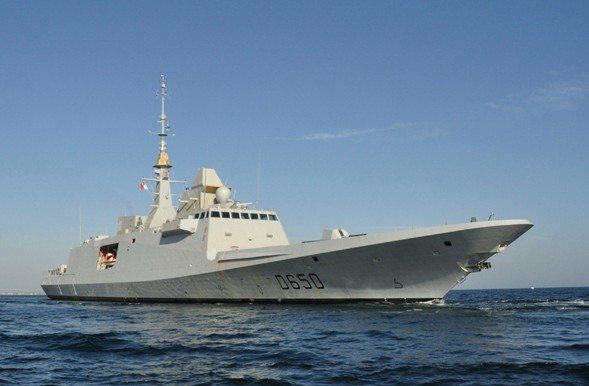One month early, DCNS begins the sea trials of the Aquitaine, the first ship built under the FREMM multimission frigate programme. The campaign takes place off the Brittany peninsula and is expected to last several weeks including return trips to DCNS’s shipyard. Delivery to the French Navy is scheduled for 2012.
The joint crew comprising French Navy personnel, customer representatives and employees of DCNS and its partners will demonstrate the ship’s seakeeping and other nautical qualities as well as the performance of the propulsion and navigation systems.
“These trials represent the culmination of the combined efforts of many people working towards common goals, including teams employed by DCNS and its partners and suppliers, the trials crews and customer representatives,” commented FREMM programme manager Vincent Martinot-Lagarde.
Day and night, test will follow test at a sustained pace. The next three days are known as the familiarisation phase. This will be used by the Navy crew and DCNS specialists to test the vessel’s safety systems and equipment, including fire-fighting, flood control and emergency response systems and evacuation procedures as well as manoeuvrability and mooring performance.
The next phase will focus on the propulsion system. The FREMM’s high-performance hybrid CODLOG (COmbined Diesel eLectric Or Gas) power package combines a gas turbine for high-speed mechanical propulsion and electric motors powered by four diesel-alternator sets for low-speed propulsion. The system will be tested in all configurations from low-speed silent-mode all-electric propulsion to high-speed gas turbine-powered mechanical propulsion, including runs at maximum speed. The trials also call for extensive testing of the ship’s navigation system (log, position, heading), inertial platforms (for positioning) and other basic systems.
Over the coming weeks, over 200 people, including 60 Navy men and women, will spend time on FREMM frigate Aquitaine. To save the ship returning to port, many will be ferried out and back.
Close cooperation between the French Navy crew in charge of the ship proper and specialists working for DCNS and its partners will ensure that all basic systems are thoroughly tested. On completing these preliminary trials, FREMM frigate Aquitaine will return to DCNS’s Lorient shipyard for several weeks of quayside work. In June, the ship will put to sea for a second campaign of trials focusing on the combat system.
FREMM, a major programme for DCNS and partners
The French FREMM programme calls for 12 ships – 11 for the French Navy and one for the Royal Moroccan Navy.
For DCNS and partners working at the Lorient centre, this is the biggest programme in progress. The Lorient job catchment is the leading beneficiary. Each year, the FREMM programme will provide 3 million hours of employment for a total of almost 50 million hours between 2006 and 2022. Each FREMM frigate represents twice the work hours that went into the spectacular Millau viaduct near the eponymous town in southern France.
FREMM frigates are among the most technologically advanced and competitively priced on the world market. These heavily armed warships are being built under DCNS prime contractorship to carry state-of-the-art weapons and systems including the Herakles multifunction radar, MdCN deep-strike cruise missiles, Aster anti-air missiles, Exocet MM40 anti-ship missiles and MU90 torpedoes.
FREMM multirole frigates are designed to respond to all types of threats with unparalleled flexibility and availability. As demonstrated by the export contract with the Royal Moroccan Navy, they are also designed to meet the needs and expectations of international client navies.
FREMM technical Specs
- Length overall: 142 m
- Beam: 20 m
- Displacement (approx.): 6,000 tonnes
- Max. speed: 27 knots
- Complement: 108 (including helicopter crew)
- Accommodation: 145 men and women
- Range: 6,000 nm (at 15 knots)











